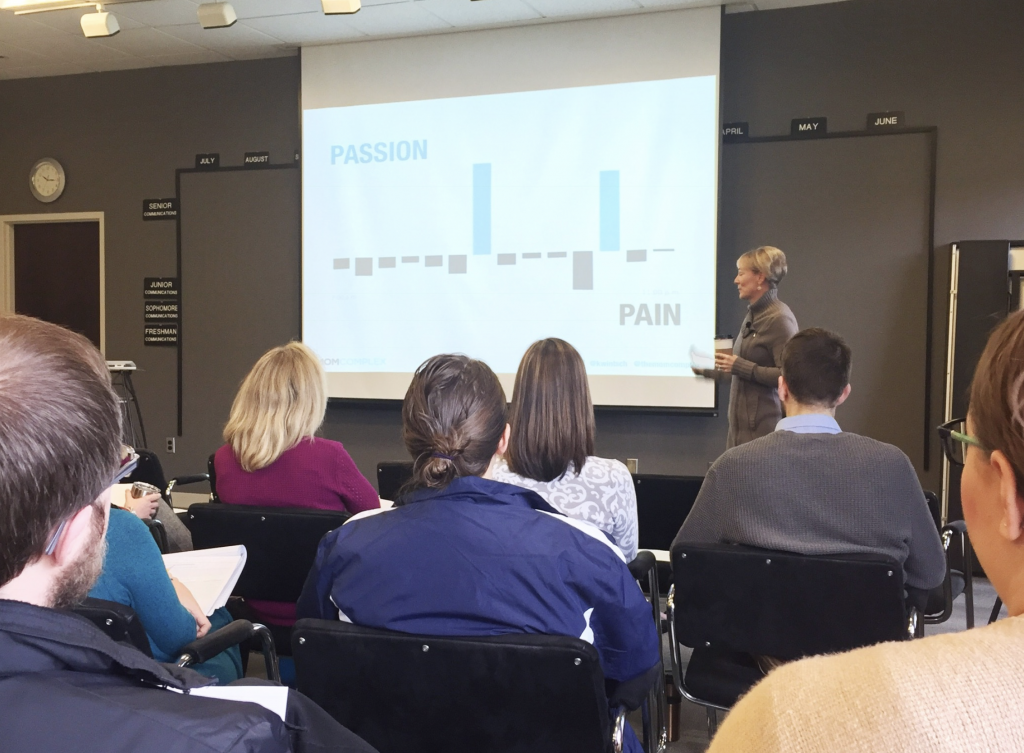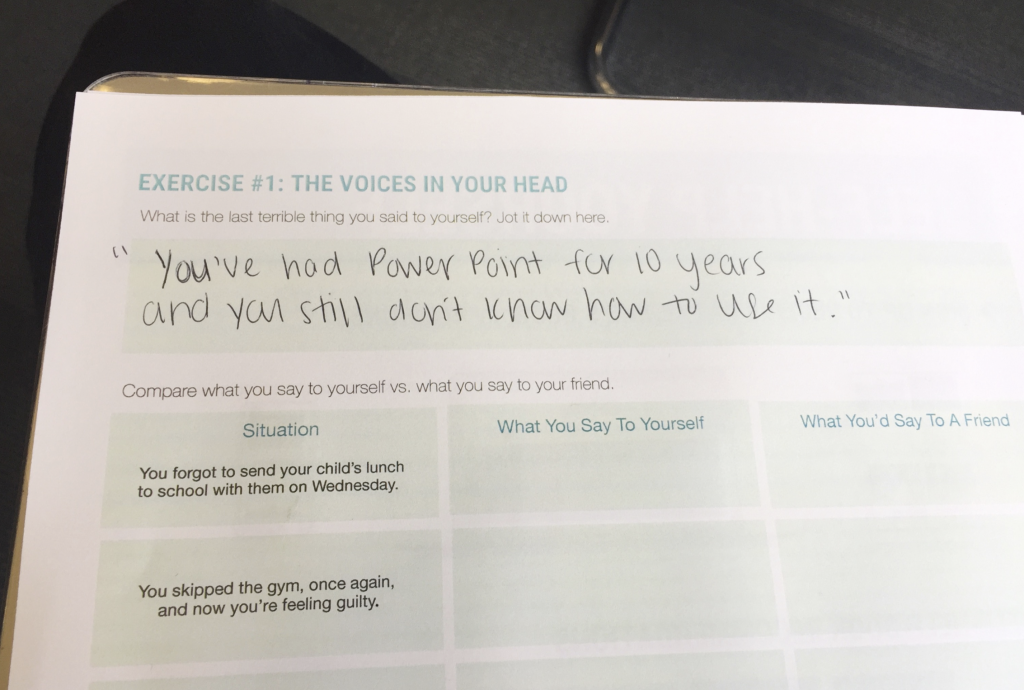There’s a phrase women use a lot, which I find disturbing. It sounds innocent enough, but it’s not so benign. It’s damaging.
The phrase is: We’re our own worst enemy. We laugh when we say it. “Oh, you know me…I’m always my own worst enemy. Hahaha.” But it’s not funny.
It’s terrible.
The next time this thought crosses your mind, instead of just letting it roll off your tongue for comedic relief, think about what the sentiment is actually saying: your greatest enemy in the world is yourself. Where’s the humor in that?
I recently experienced this struggle during a workshop for 100 working parents. During the event, I spent a lot of time talking about the mean voice we have in our heads. You know, the second-guessing, backseat-driving, condescending voice that follows you around and questions your every move.

To bring the concept to life, I asked the workshop participants one simple question: What’s the last terrible thing you said to yourself? Next, I asked for a volunteer to get the honesty party started, and Tina from the front row was brave enough to go first.
Tina was a very well-dressed, professional woman wearing a beautiful bright orange dress and funky glasses. I recognized Tina because just a few minutes earlier, she had kicked off the workshop by telling everyone that she had commissioned the workshop herself and was going to turn the idea into a larger series to benefit the entire company.
Tina was a real go-getter. My kinda girl! I was happy that Tina volunteered to go first because I was curious about what a beautiful, talented, and very driven woman would have to say negatively about herself.
Tina stood up in front of 99 people and said, “The last terrible thing I said to myself was, ‘You did a terrible job introducing Katherine. You suck and everybody knows it.’”
Holy macaroni.
There was an audible gasp in the room. I invited the group, filled with Tina’s friends and peers, to respond. Of course, they all told Tina she did a great job kicking off the workshop. What a remarkable difference between perception and reality in Tina’s eyes and the eyes of others. It begged the question: What exactly were Tina’s expectations for introducing me?
The task was to simply read my bio out loud. Was she thinking her job was to make my bio better?! Was she hoping to do an interpretive dance to bring my work experience to life? Tina’s job was to read the bio, and she did a wonderful job reading my bio. End of story. But so many of us can’t let the story end. No matter what we do, we assume we could have been better and that we probably screwed something up along the way.
After Tina’s cruel critique of herself, others volunteered to share their inner turmoil. Allison: “You’re an idiot for forgetting to send your son’s snack to school with him today.” Keisha: “You have bags under your eyes, and you look exhausted.” Margaret: “You never use your gym membership, so you’re paying to be lazy.”
Wowzers.
Everyone who shared the last terrible thing they said to themselves did not have to go far back in time. In fact, every example was from that very same day. And it was only 10 o’clock in the morning.

In the book Untethered Soul, author Michael Singer describes the voice in our head like this: “How would you feel if someone outside really started talking to you the way your inner voice does? How would you relate to a person who opened their mouth to say everything your mental voice says? After a very short period of time, you would tell them to leave and never come back. If someone followed you around and said to you what you say to yourself, you wouldn’t make it past lunchtime.“
What’s interesting is that studies show that most men do not suffer from the same mean voices in their heads that women do.
So after the women unloaded their dirty laundry, I was curious to hear from the men. How did the voices in their heads differ from the examples the women just shared? The men summarized the two very important and distinct differences:
- “The voice in my head is critical but not condescending.”
- “The voice in my head analyzes the situation, not necessarily my performance in the situation.”
Important differences. Like it or not, you’re stuck with yourself for the rest of your life. Which means you’re stuck with the voice in your head, too. So, it’s time to deal with your voice. What’s the last terrible thing you said to yourself? Now flip that on its head by…
- Thinking like a man. Can you be critical of the situation, instead of yourself?
- Thinking like a friend. What would you say to a friend who experienced the exact same situation? You’d probably tell her it’s perfectly normal, and everything will be okay.
It’s not easy to get the voice in your head to zip it, but you can tamp it down with these tips. And when you’re done, I suggest saying something nice to another woman or mother. It’s likely that she’s facing her inner enemy too, and could use a friendly ally.






